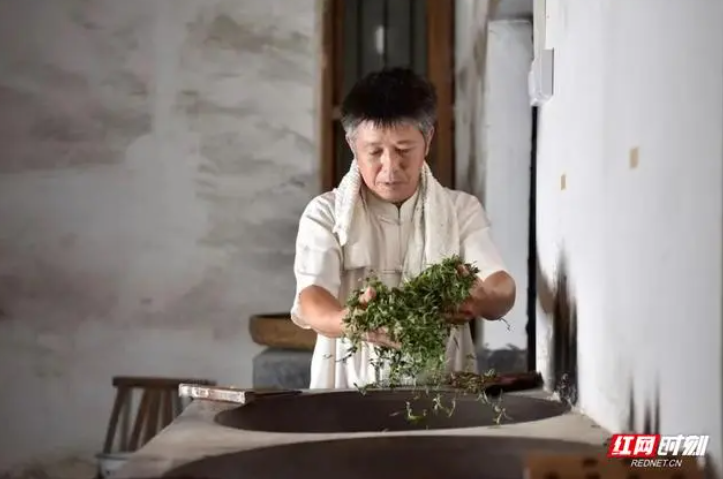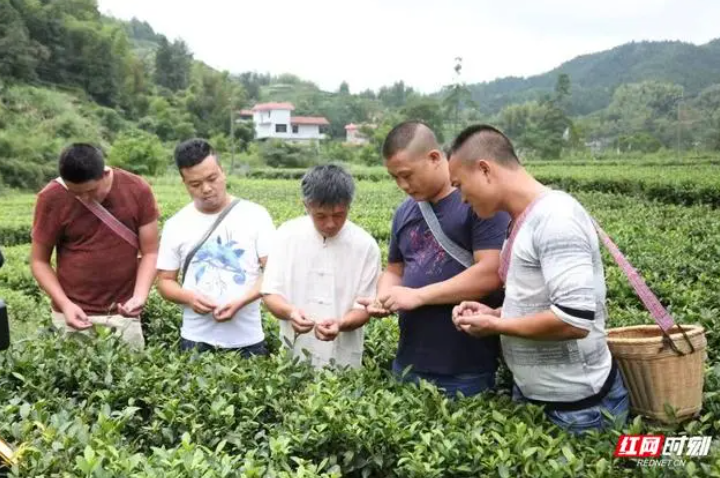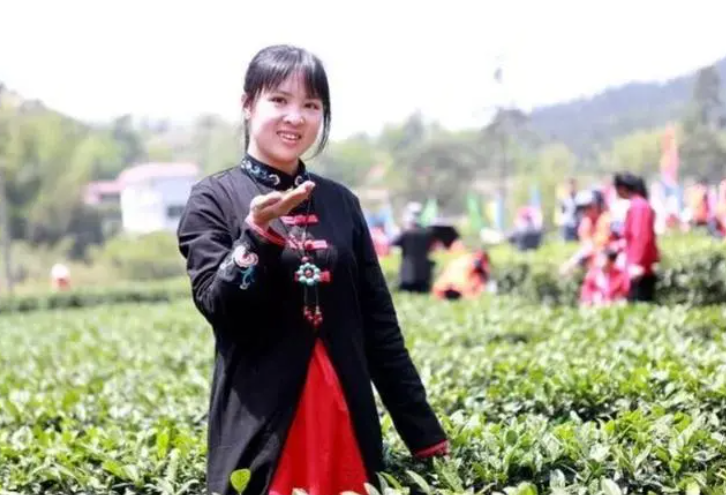Jiang Qiugui, inheritor of Linglong tea
2023-08-04 13:55:17
Qingquan Town, a small town filled with tea fragrance, is located deep in the Luoxiao Mountains and on the border of Guidong County. The ancestors here have been making a living from planting and making tea, and Linglong tea is well-known all over the world. In 2012, Linglong tea production technique was listed as an intangible cultural heritage protection projects.
The frying technique, as a key process for the quality of Linglong tea, embodies the experience and wisdom of the generations of people.
Recently, the reporter came to Qingquan Town, Guidong County to listen to the stories of Jiang Qiugui, an inheritor of Linglong tea.
Standing behind a large iron pot, Jiang Qiugui, dressed simply and draped a towel around her neck and holding a wooden implement, kept spreading tea leaves back and forth, refreshing aroma wafting in the air.
“It is the first process of tea making.”
He recalled his life about tea during the tea making break.
Qingquan Town has a long history of tea planting, which can be traced back to the late Ming and early Qing dynasties.

Jiang Qiugui, 61 years old, grew up with a tea garden from a young age. Influenced by his ancestors, he started learning how to make tea at the age of 12 at the Linglong Tea Farm.
In 1981, at the age of 17, he finished apprenticeship successfully, and then devoted himself to the research and production of Linglong tea.
Jiang Qiugui said that after being fried, Linglong tea has a delicate and exquisite appearance, with a strange curved hook shape. The tea trees grow in the mountains shrouded in clouds and mist rich in oxygen ions all year round, and absorb mountain springs, so the tea boasts excellent quality. The tea soup, with a clear yellow green color, not only has a fresh and natural taste, but also contains rich nutrients.
The tea is made through eight processes, including spreading, blanching, clearing, rolling, initial drying, shaping, cooling and rewarming, and drying.
“Handmade tea requires skill, and the same tea leaves can be fried with different qualities through different techniques.” As a tea farmer, Jiang Qiugui has a deep affection for Linglong tea. He is very meticulous in making tea, with every process in a gradual way, requiring much time and sweat.

In the 1990s, with his exquisite craftsmanship, Jiang Qiugui, encouraged by the local government, began to stand out in major tea making competitions and has won more than 20 awards at the provincial and ministerial levels, as well as the gold medal at the 5th Asia-Pacific International Expo.
In 2012, Linglong tea was successfully rated as a National Geographic Indication Product. In 2018, Jiang Qiugui was also listed as the representative inheritor of Linglong tea production technique in Hunan Province.
“Handmade tea, as a traditional skill, not only has a strong ornamental value, but also is an effective inheritance of tea history and culture.” Jiang Qiugui has adhered to the inheritance of handmade tea and its technique for decades. As he grew older, he realized that what the intangible cultural heritage item needs is more of future than merely protection.
In recent years, based on inheritance, he has continuously improved and innovated his tea and created a handmade tea brand, named Master Jiang’s Handmade Tea.
At the same time, he has nearly 20 apprentices, all of whom have already finished their apprenticeship. And his daughter Jiang Xiaomeng is an outstanding one.
After graduating from Hunan University of Science and Engineering in 2015, with deep feelings for her hometown and the tea, Jiang Xiaomeng returned to her hometown to start her own business, and learned tea planting and tea making technique from his father.
In 2018, Jiang Xiaomeng officially took over the inheritance base, established Master Jiang Ecological Tea Industry Co., Ltd. as well as the Yuanming Ecological Tea Professional Cooperative of Qingquan Town, and built a new factory.

Nowadays, the company’s annual sales volume of tea can reach over 6 tons, with a production value of over 1.8 million yuan.
With the smooth development of the company, Jiang Qiugui and Jiang Xiaomeng proposed a bold idea to build a tea garden through crowdfunding, in a bid to let villagers work in the town, share achievements, and become rich together.
No sooner said than done. They continued to improve the inheritance base, carried out free training classes of the handmade tea, and taught local young people the traditional techniques of tea planting and tea making. Meanwhile, they continued to help impoverished households in the village with tea sales and guide farmers to carry out ecological management of tea gardens.
Besides, the cooperative has provided more than 40 part-time and full-time jobs for local villagers, and driven more than 70 households in Qingquan Town to develop the tea industry, with an increase of the tea garden area by about dozens of hectares.
So far, Linglong tea has become the largest characteristic leading industry in Guidong County to lift farmers out of poverty. The total area of tea in the county is 146,000 mu (9,733.33 hectares), ranking among the key tea producing counties in China. The annual output value reaches 410 million yuan, and more than 30,000 people work in the tea industry.
In recent years, with the development of technology, automated frying machinery has become popular. “Handmade tea is more fragrant with a unique flavor that cannot be completely replaced by machines.” Jiang Qiugui said that he will better inherit and carry forward the production techniques of Linglong tea to make Linglong tea go further.




